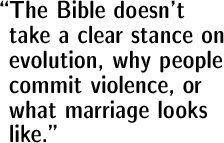Two Monologues And No Dialogue: How (Not) To Talk About Religion and Social Issues
 The past few days have highlighted for me once again the degree to which our religious nation is divided.
The past few days have highlighted for me once again the degree to which our religious nation is divided.
 The first example comes from the hugely popular megachurch pastor Rick Warren and his recent reaction when a man slaughtered moviegoers in Aurora, CO. Pastor Warren blamed the violence on those who teach evolution. “When students are taught they are no different from animals, they act like it,” he wrote on his Twitter and Facebook accounts. (He has since deleted his tweet, but not before on-line media such as The Examiner wrote about it.)
The first example comes from the hugely popular megachurch pastor Rick Warren and his recent reaction when a man slaughtered moviegoers in Aurora, CO. Pastor Warren blamed the violence on those who teach evolution. “When students are taught they are no different from animals, they act like it,” he wrote on his Twitter and Facebook accounts. (He has since deleted his tweet, but not before on-line media such as The Examiner wrote about it.)
The second example comes from The Gospel Coalition’s collection of blogs, which featured a post by author and pastor Jared Wilson. In it, Pastor Wilson explains that God’s natural order of things is for men to dominate women, and that rape results from men and women who try to fight that God-ordained hierarchy. (Like Pastor Warren, Pastor Wilson removed the blog post, under protest. Excerpts and an analysis can be found here: “Complementarians and Martial [sic] Sex: The Jared Wilson / Gospel Coalition Saga.”)
 The same Gospel Coalition is promoting an anti-homosexual marriage blog post: Gay Is Not the New Black, written by Pastor Voddie Baucham.
The same Gospel Coalition is promoting an anti-homosexual marriage blog post: Gay Is Not the New Black, written by Pastor Voddie Baucham.
Most of the reactions to these kinds of claims come in one of two varieties: (1) How could anyone possibly agree? or (2) how could anyone possibly disagree?
The naysayers cite their evidence: Pastor Warren has misunderstood the allegorical nature of Genesis, and misunderstood the natural world in that animals don’t tend to slaughter their own kind. Pastor Wilson has ignored passages such as 1 Corinthians 7:3-5 that put men and women on a par in the marriage bed. Pastor Baucham has taken 1 Corinthians 6 out of context while ignoring other relevant passages of Scripture. And so forth.
Then the claimants respond with their own evidence: Morality comes from religion, Colossians 3:18 subordinates women to men, and Leviticus forbids homosexuality.
As a Bible scholar, it’s abundantly obvious to me that both sides find ample support in Scripture. The Bible doesn’t take a clear stance on evolution, why people commit violence, or what marriage looks like — not beyond what we all agree on, at least.
But I don’t think that these are debates about evidence, science, or religion. In fact, I don’t think they are debates at all. They are, rather, collections of diatribes — monologues, as it were, instead of dialogues. And that’s because we tend to focus on our self-selected evidence instead of our motivations.
For example, if Pastors Warren, Wilson, and Baucham discovered that they were wrong about the intent of the Bible (as I believe they often are), would they change their minds? If a new manuscript surfaced, or a better understanding of the text presented itself, would they care? My suspicion is they would not.
Like slavery in its day and usury before that, these issues don’t start with the Bible. They start with how we feel.
So if we’re going to have a real conversation, I think it has to be about our motives, not the texts we choose to support them.




Thank you, Joel, for talking about this in a civil tone. Few seem to do that these days.
Part of the problem, I think, has to do with the very nature of revealed religions. If you believe that your religious opinions are the directly revealed word of God, how can you admit the possibility of another opinion? How can you even compromise?
The obligation, I believe, for those of us who are believers in revealed traditions is to be very careful about our claims. If our conception of revelation includes, not only what we receive from God, but also our own reactions, opinions, biases and attitudes, we are going to make ourselves guilty of idolatry—substituting ourselves for God. There could be nothing worse for the integrity of our beliefs, and nothing more demeaning to the truths we claim to profess, than to put our own words into God’s mouth.
Thank you Joel for an excellent observation.
I have one problem, and that with your last sentence. Too often, those with an absolute assurance that they KNOW what the Bible says on subject “X” then attribute motive to those who disagree with them. Therefore, they have already addressed “motive” in their own mind and will refuse to accept that the person with whom they dispute may in fact have a far different motive, so we are back to the beginning.
For some reason, belief in revealed religion seems to catalyze into absolutism from which there seems to be no escape.
I am not really sure how this article shows how to have a dialogue, it seems rather clear that the assumption of Dr. Hoffman (as we all do) is that he and his motives are right.